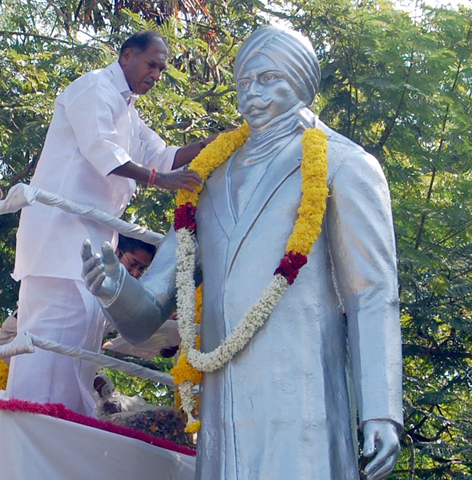(Continued from last fortnight)
Subramania Bharati is one of the great nationalist poets, social reformers, writers and revolutionaries of modern India. His works were mostly in Tamil, his mother tongue. Besides Tamil, he has also produced some wonderful poems and prose in English. Bharati was recognised as a Mahakavi, i.e. Great Poet, only several years after his death.
In this article, I adopt a step-by-step chronological approach to unravel the special features in his life that enabled Bharati to emerge as a Mahakavi.
– J.B.P. More
Among Bharati’s long poems Kuyil Paattu occupies pride of place. Some hold that it was published in 1912, others claim it came out in 1914-15. Be that as it may, we know from it that Bharati spent a great deal of time in the mango and coconut groves situated outside Pondicherry town. One day, when he was on one of his usual strolls through a grove, he heard a cuckoo singing. Overwhelmed not only by the melody of the cuckoo’s sound, but also by its beauty and the beauty of the nature that surrounded it, he wrote Kuyil Paattu. Through this poem Bharati sought to demonstrate the essential unity of life and nature.

Bharati honoured in Pondicherry.
In 1913, Bharati’s friend, Subramania Siva, after his release from prison, started a Tamil journal called Gnanabhanu in Madras. It was Subramania Siva who started republishing Bharati’s works and poems in Tamil. Thus, Bharati’s Pondicherry works like Yoga Siddhi, Oliyum Irulum, Kannan en Thai, Paapa Paattu and Puthiya Athichudi were published in Gnanabhanu. The last two were written for children. Some hold that the manuscript of Bharati’s story Chinna Sankaran Kathai was lost during the police raids on his house in Pondicherry. But parts of it appeared in Gnanabhanu. For some unknown reason, the story remained incomplete. Bharati never said why.
From 1914-15, he started contributing articles to journals and newspapers in Madras once again. He even wrote in English; his work appeared in journals like Annie Besant’s New India and Commonweal and Arya in Pondicherry. In 1914 or sometime before that, a satirical fable of his called ‘A Fox with a Golden Tail’ caused quite a flutter. His English work received much recognition, but Bharati regretted that he never received such felicitations for his works written in his mother tongue, like Panchali Sabatham.
During the 19th Century, many Tamils had been taken as coolies by the British and the French to work in the plantations in colonies like Fiji, Mauritius, Reunion, South Africa and the Caribbean Islands. Bharati, while in Pondicherry, was overwhelmed by their plight. Gandhiji had been waging a non-violent struggle against the racial discrimination practised by the Whites in South Africa. Bharati watched this struggle and the sad state of Indian labour abroad. This prompted him to write his famous poem Karumbu Thottathile (In the sugarcane plantations), in which he depicted the living conditions of the Tamils in the plantations and the hardships and atrocities that the Tamil women had to undergo in foreign lands at the hands of White masters.
Bharati was himself in poverty and want when the Russian Revolution broke out in October 1917. Of all the Tamil poets Bharati alone welcomed the revolution. He wrote a poem titled Puthiya Russia (New Russia) that praised the Revolution, supported the abolition of private property, and condemned the tyranny of the Tsar. Bharati knew about the writings of the French socialist Proudhon who was against private property. Bharati was always in agreement with Prodhon’s views. In 1918, he translated five essays of Rabindranath Tagore, the Nobel Laureate, acknowledging the greatness of Tagore and regretting that Indian newspapers were not giving adequate importance to him. At the time, he also wrote a history of the Indian National Congress in Tamil, but it was published only later.
While in Pondicherry, Bharati produced several other poems ranging from the devotional to songs in praise of nature. Some of them were Kavitha Devi Arul Vendal (1908), Guru Govinda Simha Vijayam (1909), Thisai (1909), Annai Nee Seivathene (1909), Kadal (1909), Mahasakthikku Vinnappam (1910), Thelivu (1910), Sadharana Varusha Dhumakethu (1910), Oliyum Irulum (1913), Yoga Siddhi (1913), Veyankuzhai (1914), Iravanam Tayumanavar Vazhthu (1914), Gnanabhanu Surya Sthoman (1915), and Naattu Paattu (1917).
It is noteworthy that even in his devotional songs, Bharati introduced his revolutionary ideas and thoughts on social reform. Bharati knew that the people of Tamizhagam were God-fearing. This seems to have prompted him to get across his social messages even through the medium of devotional songs.
Bharati who came to Pondicherry not knowing what was in store for him there, gradually developed a love for Pondicherry. He used to walk fearlessly on the beach road, head held high and chest thrust forward, singing the French national anthem La Marseillaise, which he even translated into Tamil.
When the Great War ended in November 1918, Bharati and his family were permitted to return to Madras and he decided to leave Pondicherry at the end of the month. He once again joined Swadesamitran but his health had deteriorated very much by then. He passed away on September 11, 1921, uncared for and unsung by his countrymen.
Pondicherry proved the most productive place for Bharati’s literary creations. If Bharati had not written Kuyil Paattu, Panchali Sabatham and Kannan Paattu there, he would never have become the Mahakavi that he became.
This article is based on J.R.P. More’s book Puducheri Valartha Bharathiar, published by Leon Prouchandy Memorial Sangam, Pondicherry, in 2011.
(Concluded)
|

